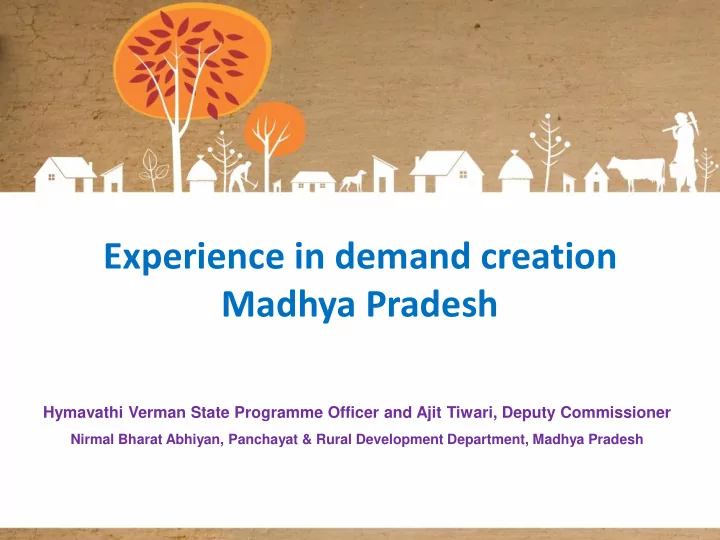

Experience in demand creation Madhya Pradesh Hymavathi Verman State Programme Officer and Ajit Tiwari, Deputy Commissioner Nirmal Bharat Abhiyan, Panchayat & Rural Development Department, Madhya Pradesh
Overview • Name of session:- Demand Creation • Title of presentation :- Experience in demand creation from Madhya Pradesh • Name of presenter with organization details :- 1. Hymavati Varman, SPO-NBAMP 2. Ajit Tiwari, Deputy Commissioner-NBA-MP • email IDs :- swsmmp@gmail.com Knowledge Sharing Forum What works at scale? Distilling critical success factors for scaling-up rural sanitation
Summary- a case study Budni block of District- Sehore Madhya Pradesh has 138 villages covering 25897 households of different social classes. The sanitation Status was poor. Till 2011 only 3 villages could gain ODF status. By adopting behaviour change methodology and focusing especially women through Maryada Campaign the block could attend ODF sta tus in most of the villages by 2013-14. Key factors for success- Adopted the participatory behaviour change approaches(CATS) to create the demand focusing “Maryada” (“dignity of women) for collective behaviour change. Human resources capacitated with necessary knowledge and skills for demand generation and appropriate technologies. Organized VWSC comprising natural men and women leaders to implement the action plan for ODF village The role of PRIs was to facilitate and utilise the government fund according to the committee. Engagement of Motivators, Swachhata doot for IPC and social mobilization. Frontline workers (ASHA, AWW, ANM) and students mobilised. Political leaders and media persons were involved to support the movement SLTS approaches used- Structuring of child cabinets and Clean School award Ensured WASH in School and Aangwadi centres Key challenges are – focus on construction of toilet rather than on Behaviour Change lack of trained and dedicated human resource personnel for community mobilization Lack of supply chain and availability of materials. Till now 126 villages out of 138 have become Open Defecation free till Dec. 2013.
Key Presentation/discussion points • MP accounts for 8% of India’s open defecators. • NBA started in the form of “Maryada “with focus on two critical methods to ensure and increase the demand towards achieving dignity/safety of women and provide better sanitation facilities to the rural community. • Sanitation frontline workers, Block motivators team capacitated. • Training of Mason on appropriate technological options. • School led Total Sanitation- Child Cabinet and Clean School award • Supply chain strengthened
Methods Adopted • Block level team of motivators with necessary skills and knowledge for collective behaviour change. • Promoted local natural leaders to plan, implement and monitor the participatory Village Action Plan. • Associated political leaders, media and local ICDS, Health and Education personnel • Block and Village Panchayats officials were involved in facilitation, supply chain management, activity monitoring and fund flow • Different design options were given to the community • Masons were trained locally and Engineers were engaged to maintain the optimum technical specifications • Inter-village peer review to learn the best practices
Method Adopted • Attractive and user friendly school toilets were constructed • Hand washing facilities were provided through the Panchayat fund. • Slogans on the walls of the toilets to educate the best practices • Anganwadi centre became the hygiene learning centre • Regular interaction with students to involve them in the movement
Method Adopted • Celebration of Open Defecation Free day in the presence of Ministers and other political leaders for celebrating success, make sustainability plan, motivate other village community and encourage the movement.
Result of the demand creation- Budni Total Household Total Schools Total Anganwadi Total Villages 25897 270 106 138 Year Household School with Anganwadi ODF without toilet Toilet & urinal with toilet Villages 2010-11 12636 16 6 3 2011-12 6352 238 84 53 2012-13 3828 270 106 95 2013-14 1644 270 106 126
Barriers/Challenges as identified • Maintaining high moral of the motivator’s team continuously • Lack of committed skilled manpower • Lack of sufficient technological options • Parallel existence of behaviour change approaches and Target driven construction activities • Non-Availability of masons and material at reasonable price • Lack of post operation and maintenance services • Defunct /missing toilets is also a barrier to achieve ODF status Knowledge Sharing Forum What works at scale? Distilling critical success factors for scaling-up rural sanitation
Key Success Factors • Community based approaches are key to change the behaviour for collective action against open defecation • A committed team of resource person, motivators, Swachhata Doot, Child Cabinet and Women’s groups can make the dream come true. • A better supply chain management gives support to the created demand. • Multiple design options of toilet for different sections of society. • Involving political leaders and Media is always helpful • Emphasis on activity monitoring system rather than construction monitoring system Knowledge Sharing Forum What works at scale? Distilling critical success factors for scaling-up rural sanitation
Recommendations for Next steps/what should be done • Main focus on Behaviour Change Communication with Interpersonal Communication and Social mobilization through local motivators (Swachhata Doot). • Training of adequate number of resource persons and masons. • Smooth Supply chain to meet the generated demand. • Total incentive fund from one scheme to avoid delays. • Ensuring post operation and maintenance services. Knowledge Sharing Forum What works at scale? Distilling critical success factors for scaling-up rural sanitation
THANKS Email :- swsmmp.org Mobile :- 9893277901
Recommend
More recommend